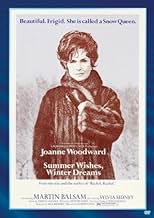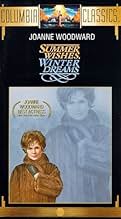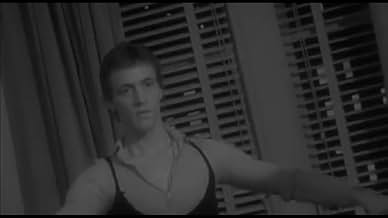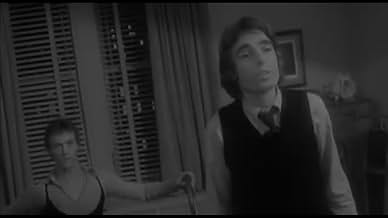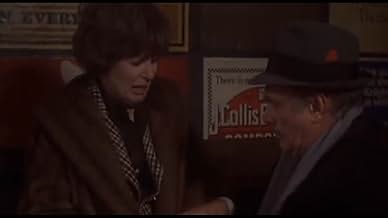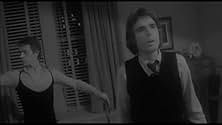Rita, a middle aged New York City homemaker, finds herself in an emotional crisis which forces her to re-examine her life, as well as her relationships with her mother, her eye doctor husban... Read allRita, a middle aged New York City homemaker, finds herself in an emotional crisis which forces her to re-examine her life, as well as her relationships with her mother, her eye doctor husband, her alienated daughter and estranged son.Rita, a middle aged New York City homemaker, finds herself in an emotional crisis which forces her to re-examine her life, as well as her relationships with her mother, her eye doctor husband, her alienated daughter and estranged son.
- Nominated for 2 Oscars
- 5 wins & 8 nominations total
Nancy Andrews
- Mrs. Hungerford
- (voice)
Charlotte Oberley
- Waitress
- (as Charlet Oberley)
- Director
- Writer
- All cast & crew
- Production, box office & more at IMDbPro
Featured reviews
By the early 1970's, films had become more personal and character studies were emerging on the screen. Such is the case with "Summer Wishes, Winter Dreams." At first glance, the film seems to be about Rita (Joanne Woodward) coping with the sudden and awful death of her mother (the wonderful Sylvia Sidney). The film then shifts to the apparently empty marriage between Rita and her husband Harry (Martin Balsam). They travel to Europe, where emotions and past resentments come to the foreground. Rita has much guilt about her son, who apparently wants nothing to do with her or Harry - we find out he is gay, but never the exact reasons why he can't stand either of them! (The son is seen only in flashbacks). Harry has a very emotional reaction while visiting Bastogne, where he fought in WWII. Rita has a breakdown in a London subway tunnel, apparently imaging she has seen her dead mother. Harry and Rita's daughter seems to have no purpose in the film except to be sanctimonious and shrill. This is not a perfect film, and at times the script jumps around. There are a few things that don't quite jive. There seems to be a lot of Freudian type psycho babble in the film (which was popular at the time). But it is the fine performance of Joanne Woodward that shines here. Ms. Woodward is one of the best actresses ever to grace the American cinema. Martin Balsam is in fine form here too. A quiet little film worth watching.
Rita, the "snow queen" is another of Joanne Woodward's aging spinster virgin frumps, that she seemed to specialise in the early 1970's. Depressed and discontent, her mental state is symbolised by the nightmare plane crash that director Gilbert Cates opens the film with. Writer Stewart Stern - who also wrote Rachel, Rachel - loads on the psycho-baggage. She has a demanding mother (Sylvia Sydney), a fat daughter (Doris Brenner), a gay son, and has married a man she did not love (Martin Balsam). All this would be unbearable with anyone but Woodward playing the role since she lightens it with her natural intelligence and sly sense of humour. It's amusing to see Balsam and Woodward argue in their middle-class educated way, though Rita's wearing a mink clues you that she isn't about to scream abuse. Balsam's subtlety, in particular makes you regret his few screen appearances. The only character that isn't redeemed by the acting is that of the gay son, since he is a cypher, and Cates presents his coming out in a homophobic black-and-white expressionistic sequence. Cates is fond of these kind of theatrical flourishes. There is a death at a screening of Wild Strawberries, a spirited chase at a former European battlefield, a family bickering at a graveyard, and Rita has a breakdown in a crowded London subway, which is probably the most believable of them all. Johnny Mandel provides a lovely theme, in his understated way, and then embarasses himself with trumpets in the battlefield sequence.
Joanne Woodward earned every bit of that Oscar nomination she received for this movie. Her performance is believable and moving. This is acting at its best (another performance I find amazing is Joanne Woodward as a victem of Multiple Personality Disorder in "The Three Faces Of Eve"- be sure to see that). Woodward never lets you down. I really liked this film because it was so real. You could really believe this was happening. But the title, "Summer Wishes, Winter Dreams" really has nothing to do with it, atleast nothing that I noticed. This is a must-see movie if you're looking for some good acting!
Summer Wishes, Winter Dreams casts Joanne Woodward as a woman going through mid-life crisis in her forties, realizing that she's settled and not selected in her choice of husband and life.
Not that husband Martin Balsam is not a good man, he's a decent enough fellow, an optometrist and back in my parents generation such a guy would have had their mothers pushing their daughters toward him. But Joanne's true love was killed in World War II and Balsam was a guy she settled for.
What brings all her anxieties to a head is the sudden death of her mother Sylvia Sidney while both women were having an afternoon of lunch and a movie. Life seemed a lot more simple back growing up on Sylvia's Connecticut farm. With a second choice husband, a daughter Dori Brenner who's not on the best of terms, a son played by Ron Richards who is gay and living in Amsterdam with another man and only seen in dream sequences, it seems like life is closing in on her. Balsam's sees what's happening to his wife and maybe this optometrist's convention in London is a great excuse for a tax deductible European trip where maybe things can be rekindled.
This film is short on plot, but long and deep on characterization with some great women's roles for actresses who've past their ingénue days. Summer Wishes, Winter Dreams got Joanne Woodward an Oscar nomination for Best Actress and for movie veteran Sylvia Sidney for Best Supporting Actress. Joanne lost to Glenda Jackson for A Touch of Class, both of those women were going for a second Oscar and Jackson lucked out.
What was a real shame was Sylvia Sidney not winning and losing to Tatum O'Neal for Paper Moon. Those supporting categories have become a really good place to honor veterans like her who have moved on to character parts. Don Ameche's award for Cocoon is a great example and I wish Sylvia had gotten this one, for her great performance here and the work of a lifetime.
Summer Wishes, Winter Dreams is a poignant film. The best scenes in it are dealing with Sidney's surviving family and how Joanne wants to hold on to the family homestead when all the rest want to sell. She can't articulate to her family why she feels she could cling to her childhood as embodied in that farm, but we the audience feels what she feels, especially those of who've had a similar experience. For me it was nothing like Woodward's in the film, but I had to face selling our family home in Brooklyn in 1997. The only survivors of my family were my brother and myself and I had my pangs as Joanne did. Three family members of mine died in that same home. What she was able to convey is the mark of a great actress.
Summer Wishes, Winter Dreams gives lie to the idea that they don't write some great parts for the female gender.
Not that husband Martin Balsam is not a good man, he's a decent enough fellow, an optometrist and back in my parents generation such a guy would have had their mothers pushing their daughters toward him. But Joanne's true love was killed in World War II and Balsam was a guy she settled for.
What brings all her anxieties to a head is the sudden death of her mother Sylvia Sidney while both women were having an afternoon of lunch and a movie. Life seemed a lot more simple back growing up on Sylvia's Connecticut farm. With a second choice husband, a daughter Dori Brenner who's not on the best of terms, a son played by Ron Richards who is gay and living in Amsterdam with another man and only seen in dream sequences, it seems like life is closing in on her. Balsam's sees what's happening to his wife and maybe this optometrist's convention in London is a great excuse for a tax deductible European trip where maybe things can be rekindled.
This film is short on plot, but long and deep on characterization with some great women's roles for actresses who've past their ingénue days. Summer Wishes, Winter Dreams got Joanne Woodward an Oscar nomination for Best Actress and for movie veteran Sylvia Sidney for Best Supporting Actress. Joanne lost to Glenda Jackson for A Touch of Class, both of those women were going for a second Oscar and Jackson lucked out.
What was a real shame was Sylvia Sidney not winning and losing to Tatum O'Neal for Paper Moon. Those supporting categories have become a really good place to honor veterans like her who have moved on to character parts. Don Ameche's award for Cocoon is a great example and I wish Sylvia had gotten this one, for her great performance here and the work of a lifetime.
Summer Wishes, Winter Dreams is a poignant film. The best scenes in it are dealing with Sidney's surviving family and how Joanne wants to hold on to the family homestead when all the rest want to sell. She can't articulate to her family why she feels she could cling to her childhood as embodied in that farm, but we the audience feels what she feels, especially those of who've had a similar experience. For me it was nothing like Woodward's in the film, but I had to face selling our family home in Brooklyn in 1997. The only survivors of my family were my brother and myself and I had my pangs as Joanne did. Three family members of mine died in that same home. What she was able to convey is the mark of a great actress.
Summer Wishes, Winter Dreams gives lie to the idea that they don't write some great parts for the female gender.
Having worked on "Summer Wishes, Winter Dreams" 50 years ago as the Unit Publicist (that's the person who is in charge of a movie's publicity while it is being filmed), this was only my third job in this field, and remains my absolute favorite. During the 3-month shoot, I actually became friends with several members of the cast and crew, the nicest, most harmonious group of people I had ever worked with. I had always been a fan of Joanne Woodward, who went out of her way to be kind to me and we kept in touch for several years after the movie wrapped. She was completely down-to-earth, warm-hearted, had a terrific sense of humor, and was far more beautiful in person than she was ever allowed to be in most of her movies. Stewart Stern was a lovely man, a brilliant writer, and we also remained friends. The director, Gil Cates, gave everyone a beautiful sterling-silver Tiffanys key chain at the wrap party and when he screened the movie for us after he had finished editing it, I honestly thought it would be acclaimed as one of 1973's finest, award-winning films. The running time of Cates' cut was 112 minutes which, to me, seemed perfect. Unfortunately, as was a custom in those bygone days, the studio had a "sneak preview" of the movie at a theater in New Jersey that was showing a raucous slapstick comedy so the audience was in no mood to watch a serious, emotional drama like SWWD and the cards they filled out were mostly unfavorable. But Columbia took this nonsense seriously and ordered the movie's creative team to cut the movie down to a more "palatable" 90 minutes. Reluctantly, the director and writer (Cates & Stern) went back to the editing room and when I saw the 92-minute release print, I was horrified. Far too many crucial scenes had either been deleted or shortened, and Sylvia Sidney's scenes were so drastically shortened that her screen time now amounted to little more than 5 minutes! Of course I was thrilled to receive my first screen credit, but somehow the fact that my name was misspelled seemed appropriate! Despite the studio's butchery, "Summer Wishes, Winter Dreams" still pleased most critics and won a few awards, but I still can't help think how much more enthusiastic its reception would have been had the far more nuanced 112-minute version been released. Scott MacDonough 1/28/2023
January 29, 2023 at 3:29 AM.
January 29, 2023 at 3:29 AM.
Storyline
Did you know
- TriviaFeatures Sylvia Sidney's only Oscar-nominated performance.
- GoofsWhen the gurney is wheeled out of the ER, the sheet over the body is relatively flat. When Rita is next to the gurney, the sheet is elevated due to the body's arms being across the body.
- Quotes
Mrs. Pritchard - Rita's Mother: I thought I was having a heart attack.
- ConnectionsFeatured in Oscars, Actors and The Exorcist (1974)
- SoundtracksWhere is your Heart
(Moulin Rouge)
Music by Georges Auric
French lyrics by Jacques Larue
English lyrics by William Engvick
- How long is Summer Wishes, Winter Dreams?Powered by Alexa
Details
Contribute to this page
Suggest an edit or add missing content

Top Gap
By what name was Summer Wishes, Winter Dreams (1973) officially released in Canada in English?
Answer
